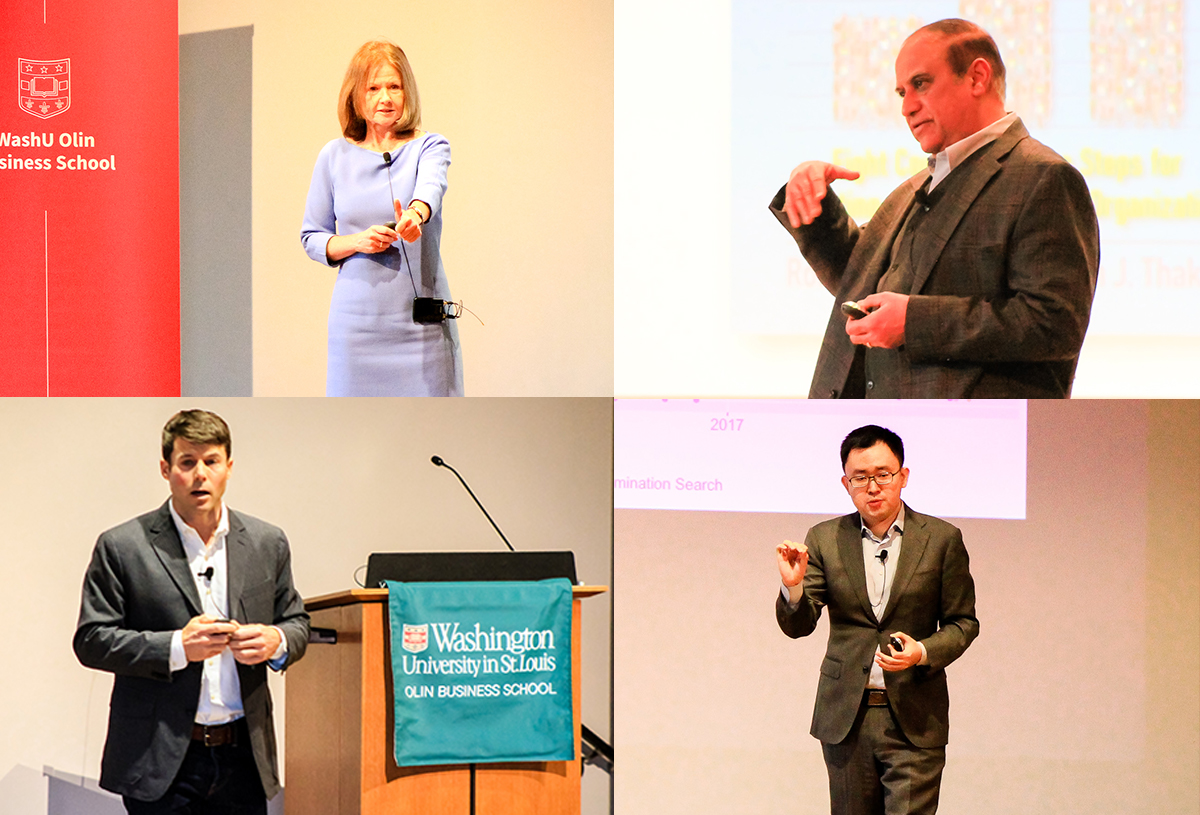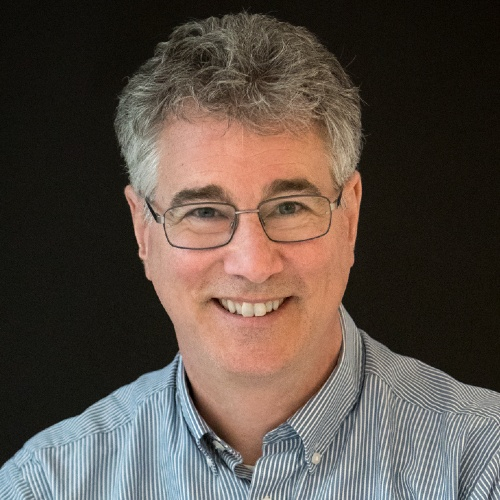Olin ‘A-team’ offers business-building research at Century Club event
- January 24, 2019
- By Kurt Greenbaum
- 5 minute read

Give everyone in your startup organization a voice, but not necessarily a vote. Watch the companies with a high “research and development quotient.” Discover purpose and foster a purpose-driven workforce. Learn how to mitigate racism in the sharing economy.
These snippets of wisdom were among the guidance four Olin Business School faculty members offered at a Century Club event on January 24. The TED talk-styled event drew a standing-room only audience to Emerson Auditorium as the four professors shared ideas about “making business better” drawn from their research. (Missed it? Watch the recorded live stream of the event.)
Olin visitors, alumni and students heard from Andrew Knight, professor of organizational behavior; Anne Marie Knott, Robert and Barbara Frick Professor of Business; Anjan Thakor, John E. Simon Professor of Finance; and Dennis Zhang, assistant professor of operations and manufacturing management. Dean Mark Taylor described the slate of speakers as “an A-team of talent” in the Olin faculty.
Andrew Knight: “Effective Leadership for Startup Teams”
 Knight threw the audience a curveball as he described a hard-driving, entrepreneurial, often abrasive, black-turtleneck-wearing, innovative executive. No, he wasn’t talking about Steve Jobs. He was talking about Elizabeth Holmes, now disgraced founder and former CEO of defunct blood-testing firm Theranos.
Knight threw the audience a curveball as he described a hard-driving, entrepreneurial, often abrasive, black-turtleneck-wearing, innovative executive. No, he wasn’t talking about Steve Jobs. He was talking about Elizabeth Holmes, now disgraced founder and former CEO of defunct blood-testing firm Theranos.
“This grandiose leadership style is not necessarily an ingredient for building a successful startup company,” Knight noted, citing his and other research in the field. “Your first act of leadership is building a team.”
“Entrepreneurs develop strong feelings of psychological ownership over their companies,” he said. “When we have ownership over something, we’re motivated to invest in it.”
But Knight contrasted psychological ownership over a firm with collective ownership: “If you don’t have a ‘we,’ you can’t have an ‘ours.'” The key, however, is for startup leaders to understand how to balance systematic “help-seeking” with the need to offer explicit and effective guidance on where the contributions from other team members are needed—and where they’re not.
“The most effective leaders are ambidextrous,” he said. “On the one hand, they give people a voice, but a voice is not a vote.”
Anne Marie Knott: “How Innovation Really Works”
 Knott offered a startling slide: Let a $1,000 investment in the market ride from the early 1970s until today and the value will have risen to nearly $80,000. But roll that same investment year-over-year into companies with a high “RQ”—a measure of the return on R&D investments—and you’d have returned almost 10 times as much.
Knott offered a startling slide: Let a $1,000 investment in the market ride from the early 1970s until today and the value will have risen to nearly $80,000. But roll that same investment year-over-year into companies with a high “RQ”—a measure of the return on R&D investments—and you’d have returned almost 10 times as much.
Her deep dive into the value firms place on R&D spending came as she looked at Nobel-prize winning research on the primary reasons for growth in the economy—traditionally increases in the labor pool, the quality of labor and the availability of capital.
“When you think of Nobel theories, you think they’re remote, they have nothing to do with me,” Knott told the audience. “I want to convince you that you play a role in this.”
In fact, one of the greatest predictors of corporate growth is RQ, a creation borne of her research and featured last year in a Harvard Business Review cover story.
“Where does growth come from? Historically, economists believe it came from growth in the labor force, growth in the quality of labor and capital. But those three things only account for 37 percent of growth,” she said. “The role of knowledge is to make you more productive with any level of capital and labor. And where does knowledge come from? It comes from R&D.”
Knott tracked GDP growth along with R&D spending and found a corresponding rise in both in the 1950s, while she found a decline in R&D spending in the 1980s that never picked up. The conventional wisdom says R&D has just gotten harder.
“I’ve developed a more optimistic explanation. My explanation is that companies have gotten worse at R&D,” she said. “That may not sound more optimistic, but you want me to be right.”
Anjan Thakor, “Creating a Purpose-Driven Organization”
 “The first question I get when I talk about higher purpose is ‘what do you mean?'” Thakor told the audience. One of his best definitions came simply from the story of an employee at The Inn at Little Washington in Virginia.
“The first question I get when I talk about higher purpose is ‘what do you mean?'” Thakor told the audience. One of his best definitions came simply from the story of an employee at The Inn at Little Washington in Virginia.
Short version: A relatively low-level employee took the initiative to drive eight hours on behalf of hotel guests who had left their clothes at home. For the longer story, check out Thakor’s piece on Live Mint.
“When we talk about higher purpose, it’s really a pro-social contribution,” Thakor said, summing up his research and a recent HBR cover story. “It’s the intersection of purpose with your business decisions. It’s deeply connected with your business. It’s about who you are and where you came from, but most importantly, where you’re going.”
Businesses have risen from ruins because of their ability to recognize and capitalize on purpose, Thakor said. They have excelled and grown. But they don’t do it at the expense of making a buck—a point that aligns well with Olin’s brand promise: We create values-based, data-driven leaders who are prepared to change the world, for good.
“Pursuing a higher purpose cannot be a charity,” Thakor said. “It’s key that whatever higher purpose you come up with, it has to be authentic—and it’s discovered. It’s not invented.”
Dennis Zhang, “Discrimination in the Sharing Economy”
 Lyft. Uber. AirBnB. They’re market leaders in the sharing economy and almost everyone has heard of them, even if they haven’t used them. And as Zhang pointed out, most everyone has heard that they’ve been plagued by charges of discrimination and racism—charges virtually unheard until around 2016.
Lyft. Uber. AirBnB. They’re market leaders in the sharing economy and almost everyone has heard of them, even if they haven’t used them. And as Zhang pointed out, most everyone has heard that they’ve been plagued by charges of discrimination and racism—charges virtually unheard until around 2016.
Since then, Zhang and his research partners have looked at the reasons and, through their study, found solutions. The basics are derived from earlier research that says discrimination is more likely to happen when we don’t know enough about the individuals we are working with. The more we know, the less we discriminate.
“People discriminate not because they’re inherently racists, but because they do not have enough information about each other,” Zhang said. “They base decisions on group averages. So what’s the solution? To provide more information about individual (AirBnB) guests.”
Indeed, he found in an experiment with AirBnB, using newly created (and fictitious profiles), hosts tended to accept significantly fewer accommodation requests from people with African American-sounding names—28.7 percent versus 47.8 percent for requests from potential guests with “white” names.
However, add a single positive review from another host and the difference virtually vanishes. “When we have a positive review, things change,” he said. “Acceptance rates dramatically increase and stabilize around 58 percent.”
Pictured above: clockwise from top left: Anne Marie Knott, Anjan Thakor, Dennis Zhang, Andrew Knight.
Media inquiries
For assistance with media inquiries and to find faculty experts, please contact Washington University Marketing & Communications.
Monday–Friday, 8:30 to 5 p.m.
Sara Savat
Senior News Director, Business and Social Sciences
